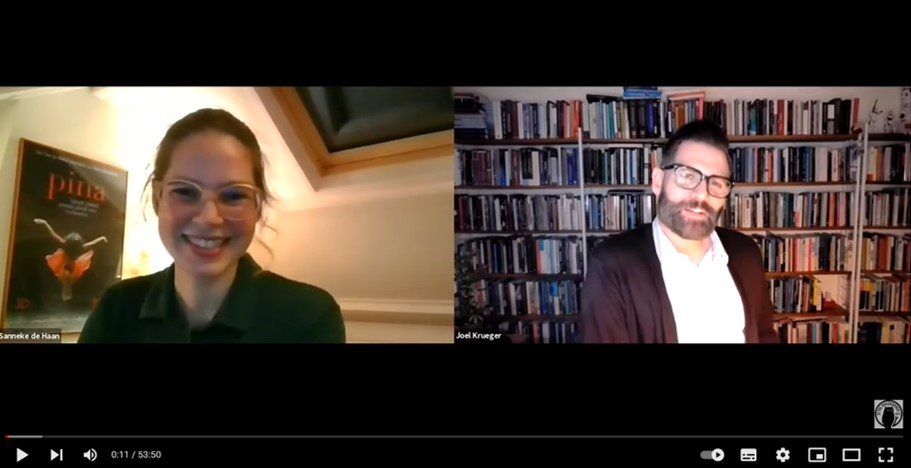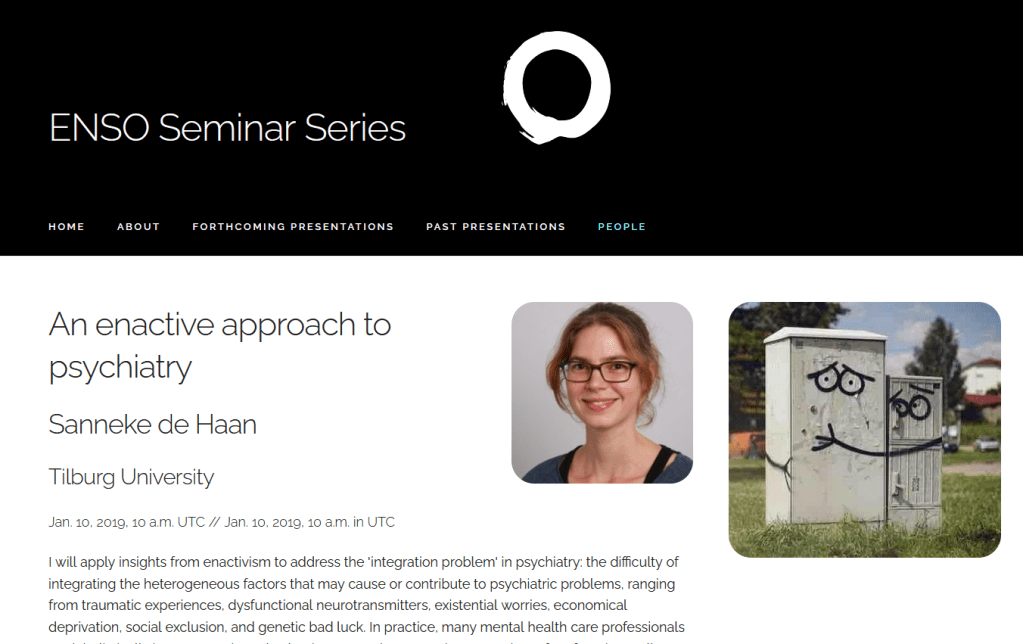Self-illness ambiguity & relational authenticity in psychiatry
Sanneke de Haan (2025), Jezelf zijn doe je niet alleen. Een enactivistische benadering van relationele authenticiteit. Algemeen Nederlands Tijdschrift voor Wijsbegeerte, Volume 117, Issue 1, Mar 2025, pp. 4 – 31.
Sanneke de Haan (2025), Is Betty nu wel of niet authentiek? Over zelfbevestigende bubbels, ethiek, en de rol van grenzen bij een enactieve benadering van relationele authenticiteit. Algemeen Nederlands Tijdschrift voor Wijsbegeerte, Volume 117, Issue 1, pp. 68-79.
Sanneke de Haan (2023), What do my problems say about me? Philosophical Explorations, pp. 1-6.
Roy Dings & Sanneke de Haan (2022), The Role of Self-Illness Ambiguity and Self-Medication Ambiguity in Clinical Decision-Making, American Journal of Bioethics 22(6), pp.58-60.
Sanneke de Haan (2020) – The need for relational authenticity strategies in psychiatry. Philosophy, Psychiatry, & Psychology 27 (4), pp. 349-351.
Sanneke de Haan (2020) – Jezelf zijn doe je niet alleen. In: Hier ben ik, ed. Hans Dooremalen. Brave new books, pp. 245-257.
An enactive approach to psychiatry
Sanneke de Haan (2024), Sense-Making and the Enactive Turn in Psychiatry. In: Awais Aftab (ed.), Conversations in Critical Psychiatry. Oxford: Oxford University Press.
Sanneke de Haan (2021), Two enactive approaches to psychiatry: two contrasting views on what it means to be human. Philosophy, Psychiatry, & Psychology 28 (3), pp. 191-196.
Sanneke de Haan (2020), Enactive Psychiatry. Cambridge University Press.
Sanneke de Haan (2020), Bio-psycho-social interaction: An enactive perspective. International Review of Psychiatry, pp.1-8
Sanneke de Haan (2020), An enactive approach to psychiatry. Philosophy, Psychiatry, & Psychology 27 (1), pp. 3-25.
Sanneke de Haan (2020), Enactivism as a new framework for psychiatry. Philosophy, Psychiatry, & Psychology 27 (1), pp. 1-2.
Sanneke de Haan (2020), Enactive causality: Interventions, cakes and clockworks. A reply to Gallagher and Donovan and Murphy. Philosophy, Psychiatry, & Psychology 27 (1), pp. 31-33.
Sanneke de Haan (2017), The existential dimension in psychiatry: an enactive framework. Mental Health, Religion & Culture 6, pp. 528-535.
Sanneke de Haan (2013), De existentiële dimensie van de psychiatrie: een enactivistische benadering. Psyche & Geloof 24-2, pp. 130-140.
Online interview with Joel Krueger: Mind, body, and world in psychiatry – A digital dialogue, organized by The Philosopher
Online talk: Sanneke de Haan (2019) – An enactive approach to psychiatry. ENSO Seminar Series.
The impact of DBS on the experiences of OCD patients: Phenomenology & Identity
Snoek, A, de Haan, S.E., Schermer, M., Klosterkötter, D. (2019), On the Significance of the Identity Debate in DBS and the Need of an Inclusive Research Agenda. A Reply to Gilbert, Viana and Ineichen. Neuroethics.
Sanneke de Haan (2017), Missing oneself or becoming oneself? The difficulty of what “becoming a different person” means. AJOB Neuroscience, 8(2), pp. 110-112.
Sanneke de Haan, Rietveld, E., Stokhof, M., Denys, D. (2017), Becoming more oneself? Changes in personality following DBS treatment for psychiatric disorders: Experiences of OCD patients and general considerations. PLoS ONE 12-4, pp. 1-27.
Sanneke de Haan, Rietveld, E., Stokhof, M., Denys, D. (2015), Effects of Deep Brain Stimulation on the lived experience of Obsessive-Compulsive Disorder patients. In-depth interviews with 18 patients. PLoS ONE 10-8, pp. 1-29.
Sanneke de Haan, Rietveld, E., Denys, D. (2014), Stimulating good practice: what an embodied cognition approach could actually mean for DBS practice. AJOB Neuroscience 5-4, pp. 46-48. Comment on: Giulio Mecacci & Pim Haselager (2014) Stimulating the Self: The Influence of Conceptual Frameworks on Reactions to Deep Brain Stimulation, AJOB Neuroscience, 5-4, pp.30-39.
Sanneke de Haan, Rietveld, Erik, Stokhof, Martin, Denys, Damiaan (2013), The phenomenology of Deep Brain Stimulation-induced changes in OCD: An enactive affordance-based model. Frontiers in Human Neuroscience 7, pp. 1-14.
Phenomenological psychopathology – Schizophrenia | OCD | Embodiment
Fuchs, T., Martin, L., de Haan, S.E., Ludwig, M. (2021). Schizophrene Welten verstehen. EASE und EAWE – phänomenologische Interviews zur Erfassung schizophrener Erfahrungen. Stuttgart: Kohlhammer.
J. Luigjes, V. Lorenzetti, S.E. de Haan, G.J. Youssef, L.F. Fontenelle, C. Murawski, Z. Sjoerds, W. Van den Brink, D. Denys, M. Yücel (2019), Defining compulsive behaviour. Neuropsychology Review 29, pp. 4-13.
Gipps, R.G.T. & de Haan, S.E. (2018), Schizophrenic Autism. In: G. Stanghellini, M. Broome, A. Fernandez, P. Fusar-Poli, A. Raballo, R. Rosfort (eds). Oxford Handbook of Phenomenological Psychiatry. Oxford: Oxford University Press, pp. 812-826.
Sanneke de Haan, Rietveld, E., Denys, D. (2015), Being free by losing control: What obsessive-compulsive disorder can tell us about free will. In: W. Glannon (ed.), Free will and the brain: Neuroscientific, philosophical, and legal perspectives. Cambridge: Cambridge University Press, pp. 83-103.
Sanneke de Haan (2013), Te veel denken is gevaarlijk. Fenomenologie van hyperreflexiviteit en lichaamservaring in de psychiatrie. In: M. Schermer & M. Boenink & G. Meynen (red.), Komt een filosoof bij de dokter. Amsterdam: Boom, pp. 35-48.
Sanneke de Haan, Rietveld, E., Denys, D. (2013), On the nature of obsessions and compulsions. In: D. Baldwin & B. Leonard (eds.), Modern Trends in Pharmacopsychiatry – Anxiety Disorders. Basel: Karger. pp. 1-15.
Van der Kraats, G.B., de Haan, S.E., Meynen, G. (2012), Zelfbeleving in de vroege fase van psychose: een fenomenologisch benadering. Tijdschrift voor Psychiatrie 54-12, pp. 1021-1029.
Sanneke de Haan (2011), Fenomenologie van de lichaamservaring. In: D. Denys & G. Meynen (red.), Handboek Psychiatrie en Filosofie. Utrecht: De Tijdstroom, pp. 213-229.
Sanneke de Haan, S.E. & Fuchs, T. (2010), The ghost in the machine: disembodiment in schizophrenia. Psychopathology 43, pp. 327-333.
Laroi, F. & de Haan, S.E. & Jones, S. & Raballo, A. (2010), Auditory verbal hallucinations: dialoguing between the cognitive sciences and phenomenology. Phenomenology and the Cognitive Sciences 9, pp. 225-240.
Affordances | Enactivism | Minimal self | Other
Groenevelt, I, de Haan, S.E., Slatman, J. (2022), Doing bodies in YouTube videos about contested illnesses. Body & Society 28 (4), pp.28-52.
M. de Boer & S.E. de Haan (2022), Health Humanities. Een interdisciplinaire, intersectionele kijk op gezondheid, ziekte, en welzijn. Tijdschrift voor gezondheidszorg en ethiek 32(3).
Luigjes, J, & de Haan, S.E. (2020), Psychiatrische stoornissen zijn geen hersenstoornissen. In: D. Denys, G. Meynen (eds.), Het tweede handboek psychiatrie en filosofie. Amsterdam: Boom | De Tijdstroom, pp. 163-183.
Rietveld, E., de Haan, S.E., Denys, D. (2013), Social affordances in context: What is it that we are bodily responsive to? Brain and behavioral Sciences 36, pp. 436-436.
de Bruin, L.C. & de Haan, S.E. (2012), Enactivism and social cognition: In search for the whole story. Journal of Cognitive Semiotics IV (1), pp. 225-250.
Sanneke de Haan & De Jaegher, H. & Fuchs, T. & Mayer, A. (2011), Expanding perspectives. The interactive development of perspective-taking in early childhood. In: W. Tschacher & C. Bergomi (eds.), The implications of embodiment: cognition and communication. Exeter: Imprint Academic, pp. 129-151.
Sanneke de Haan (2010), The minimal self is a social self. Comment on Zahavi’s ‘Minimal self and narrative self: A distinction in need of refinement’. In: T. Fuchs & H. Sattel, & P. Henningsen (eds.), The embodied self. Dimensions, coherence, and disorders. Stuttgart: Schattauer Verlag, pp. 12-18.
Sanneke de Haan & de Bruin, L.C. (2009), Reconstructing the minimal self, or how to make sense of agency and ownership. Phenomenology and the Cognitive Sciences 9, pp. 373-396.


